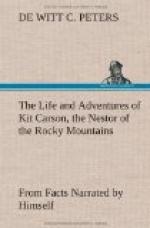own language, “are synonymous with truth.”
The gloom which had prevailed over the party, while
the men recounted to their friends the details of
the fight was temporarily dispelled; and, while thus
engaged, the command moved on about two miles from
the Indian village. Having here selected a site,
they went into camp. After comfortably stowing
themselves away in this resting-place, another “war
talk” was called, and what was best to be done
was canvassed over. After the adjournment of the
council, Fremont decided to send back twenty men,
under Richard Owens, to the neighborhood of the ruins
of the village, there to conceal themselves and await
the return of the Indians; who, it was thought, might
come back to look after their dead. He did so;
and Owens had not been secreted a great while before
about fifty savages returned, and, by the moon’s
light, were quite visible. As had been previously
agreed upon, word was sent by a trusty messenger to
Fremont, who, with six companions, Kit Carson being
of the number, hastened on horseback to join his outpost.
For fear of being discovered, Fremont chose a different
route from the one taken by Owens, which was quite
direct, while that of the former was circuitous.
On approaching the smouldering remains of the village,
Kit Carson discovered only one Indian wandering about
on the ground. As soon almost as he was seen by
the party, they made a dash at him. Kit Carson
was in the advance, and on arriving within about ten
feet of the warrior, he drew up his horse and brought
his rifle to his shoulder to fire, but the gun only
snapped, and left its owner in a very precarious situation,
as the red man had already drawn the string of his
bow to plant an arrow in the body of his adversary.
A moment more and, in all probability, Kit Carson
would have been breathing his last. Fremont saw
the danger his friend was in, although Kit had tried
to avoid the arrow by throwing himself on one side
of his horse. With much forethought, as well as
personal exposure, he plunged the rowels of his spurs
deep into his riding animal. The noble horse,
obeying the impetus thus given by his rider, made
a few extra strides, until he reached, knocked down
and passed over the Indian, thereby causing his arrow
to fly in a different direction from the one intended.
Before the savage could regain his feet, a ball from
one of the rifles belonging to the party had sent
him to his last resting-place. Fremont now learned
from Owens, that while the messenger was absent, the
rest of the Indians had decamped, and as he had received
orders from him to await his coming in case he found
the enemy, therefore, he was obliged to let the rascals
quietly depart without firing into them, which was
much to his own and his men’s displeasure.
[Illustration: A moment more and in all probability Kit Carson would have been breathing his last. Fremont saw the danger his friend was in, although Kit had tried to avoid the arrow by throwing himself on one side of his horse.—PAGE 265.]




